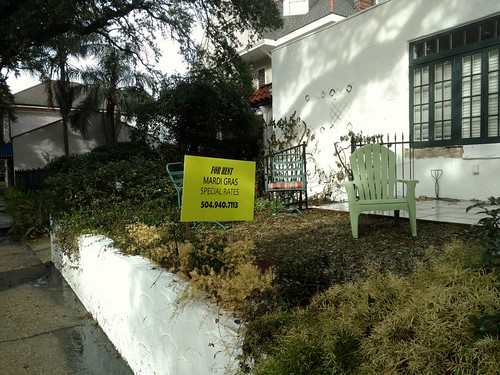
After the strip club drama subsided, another thing happened yesterday at the CPC meeting. Action on the Sun Yard development was deferred to next month. Regardless, the meeting was packed with concerned neighbors who all spoke against the poshtel/entertainment venue/place-space-park-and-pool or whatever Sun Yard is actually purporting to be.
One thing it is definitely not, as two organizers point out in this Lens opinion piece, is an acceptable "alternative to Airbnb."
Wait. Really? Hotel guests shuttling in and out of a 37-unit complex in a residential district aren’t themselves short-term visitors?Whether it be through short term rental "disruption" or through luxury travel or high end condo development, the effect is still the displacement of residents for the benefit of investors. That is what we need our land use policy to guard against. This isn't just about one development in particular. It's a fundamental matter of whether policymakers respond to the demands of people or to the demands of capital. Are we governed by an inclusive democratic political process or by a wealthy network of oligarchs?
New Orleans faces a massive crisis of affordable housing. According to Jane Place Neighborhood Sustainability Initiative, a local housing justice organization, the city will need an estimated 33,000 additional units of affordable housing over the next 10 years to mitigate this crisis.
Since 2000, New Orleans rents have increased by 54 percent, the cost of homes has increased by 50 percent, yet the average income has increased by only 2 percent.
An article published by The Lens in October noted that 6-to-8 percent of residential properties in the Bywater are now listed as short-term rentals. With fewer and fewer housing units available, rents and property taxes rise. Working people are pushed out of their communities and scattered to the margins of the city.
The Sun Yard development would remove five affordable housing units from the market. It would draw more tourists to the Upper Ninth Ward and accelerate the process of gentrification on both sides of St. Claude Avenue. The developers’ plans call for interior demolition of the historic homes, leaving only the original facades visible from the street, a Potemkin village in place of a once vibrant New Orleans neighborhood.
From the looks of things we won't get a good test of this until the Winter Council gives way to the newly elected government in May. Nobody in this article seems to think the lame ducks want to touch the Airbnb rules. That hasn't stopped Eric Bay's group from pushing further liberalization, though.
A group promoting short-term rentals in New Orleans wants to double the number of days that tourists can rent homes in residential neighborhoods and expand Airbnbs to the French Quarter, where they’re mostly banned now.ANP's strategy going forward will be to pretend their plan to grandfather in existing STR licenses and set a "limit" at twice the number currently operating is actually a cap that is going to, in Bay's words, "protect affordable housing."
The proposal would cap the number of whole-home rentals in residential neighborhoods, but it would allow currently licensed rentals to remain.
However, even the head of the group behind the proposal, the Alliance for Neighborhood Prosperity, doesn’t expect it to gain traction before May. That’s when five of the seven council members will be replaced with newcomers and when District B Councilwoman LaToya Cantrell will be inaugurated as mayor.
A memo describing the proposed revisions calls for limiting new, whole-home Airbnbs in residential districts — regulated through “temporary licenses”— to two per block face
With these proposals, “we are not taking over neighborhoods. We are protecting affordable housing,” Bay said. “We wrote those proposals with an opposition mindset.”
His group proposes doubling a nightly tax collected by the city from $1 to $2, which is used for affordable housing and blight remediation. It also calls for significantly increasing permit fees for all three types of short-term rental licenses.
While it’s not clear that the Alliance’s proposal will gain support from current or incoming council members, it’s a sign that the debate over short-term rentals is not settled.
What the ANP plan actually does is click the ratchet at the current rate of destruction while setting things up for the next turn. It also disingenuously appropriates the use of "affordable housing" rhetoric in order to finesse the growing public outcry. Bay and others profiting from turning houses into hotels began this fight arguing that there is no evidence that the practice has any effect on housing costs. Since that time study after study has shown this to be an obvious lie. And so, suddenly, Bay is an affordable housing advocate.
Will it work? That depends, again, on whether or not the newly elected council and mayor are actually responsive to the concerns of their electorate. I am not optimistic. Even as STRs are becoming less and less popular as people suffer from the housing crunch, proponents are getting more organized and have a slick strategy in place to move for expansion. This Lens article suggests that councilmembers are nervous about taking a politically sensitive action at this point. But regardless of what they say, the fact remains ANP has everybody's ear including the incoming mayor's. Their strategy is designed to allow electeds the wiggle room to say they oppose STR expansion
but still end up supporting something branded as a "limit." The tax increase is meant as a sweetener as well. We look forward to listening to LaToya Cantrell applaud the measure as an earnest attempt at "finding balance."
That "balance" still may mean you gotta get up and move out of the way of these tourists. The city (and its partners) needs that revenue, after all.
#onetimeinNOLA some folks got evicted by their landlord to make way for an @airbnb and put that shit on blast #happymardigras pic.twitter.com/O5120Pg2M9— Klaus Nomi Malone (@prokchorp) February 5, 2018
No comments:
Post a Comment